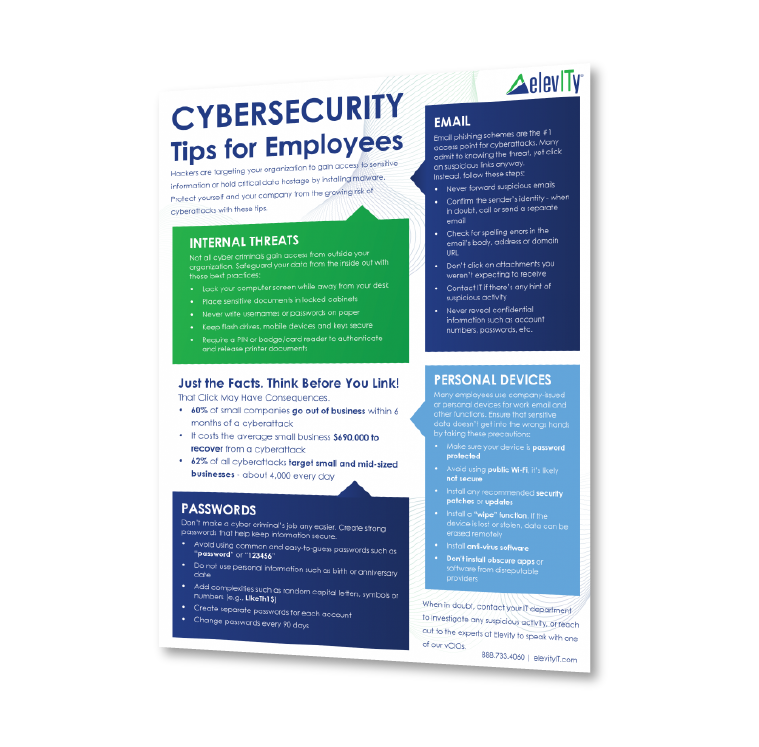As businesses grow and attract more customers, they also may attract cybercriminals who want to access customers’ personal data, including social security numbers, credit card information and much more. Hackers may also install ransomware, locking a company’s data until it pays to have the data restored.
Estimates suggest that half of all small businesses in the United States were breached last year, according to the 2016 State of SMB Cybersecurity Report. Cyberattacks are so rampant among small- and medium-sized businesses that Congress enacted legislation to help equip small businesses with resources to combat what many call a national crisis.
Still, many small- or medium-sized businesses think it will never happen to them. If you’re among those, think again and consider these six signs that your business is vulnerable to a cyberattack.
1. Software Patches
Outdated systems are the most vulnerable to malicious security breaches, especially those that haven’t had security patches and upgrades installed. The vulnerabilities of older systems and how to gain access to them are widely known, even among amateur hackers. New technology isn’t exempt, however. Even the best operating systems need frequent updates and added antivirus and security patches. Some organizations choose to use a managed IT service to automatically update and install patches, removing the guesswork for many companies with limited IT resources.
2. Unreputable Cloud Storage
There are many popular Cloud storage solutions available, and the growing consensus is that the use of the Cloud for data storage will only increase in coming years. There are some free options, but most are unsuitable to store the volume of data most businesses collect. Choosing a reputable Cloud storage company may cost a little more, but not doing so may cost you much more, including your business — 60% of small companies go out of business within six months of a cyberattack.
3. Data Isn’t Encrypted
You’d be surprised how many small companies still keep sensitive customer information in simple spreadsheets and store it in the Cloud or on company servers. It’s like having a “welcome” sign posted for cybercriminals. Progressive organizations need to adopt new practices and technologies with firewall protection to protect customers’ bank accounts, routing numbers and a host of other data. Encryption uses algorithms to encode plain text into unreadable data and provide an added measure of security by making it accessible only to authorized users. Most dynamic CRM software has built-in functionality that automatically enables encryption.
4. Third Party Services
Perhaps you’ve taken every measure possible to secure your data, but have your vendors? Many service providers, such as accountants and legal firms, access your data, and they need to take the same precautions you do to ensure that data is secure. Likewise, if you use third-party software for payroll or other functions, it’s important to know if the company has proper security measures in place.
5. Lack of Wi-Fi Protection
Wireless routers are more easily targeted by hackers than wired connections, and if you’re using an older model router, it likely hasn’t had the proper firmware upgrades to provide stronger firewalls. If you’re using your router’s default network name, hackers can easily gain access using software to crack password codes. What used to take weeks to hack into a system can now happen in a matter of minutes if your Wi-Fi network is unsecured.
6. Employees Aren’t Trained
While we’ve focused on ways to prevent cyberattacks through the use of technology, the #1 vulnerability continues to be human error. Employees continue to be lured by sensational phishing scams and deceptive tactics, clicking on suspicious links or attachments that open the door for hackers to install ransomware and steal data. Of all the measures that your company can put in place to prevent cyberattacks, education may be the most effective. Inform employees about the risks and how they can do their part to help secure your data.
Addressing all these factors can be overwhelming for many small- and medium-sized businesses. Using a reputable managed IT service can help you address your security needs and protect your data, your livelihood and that of your employees. Reach out to us today for a no-obligation consultation.





%20cropped.jpg)



